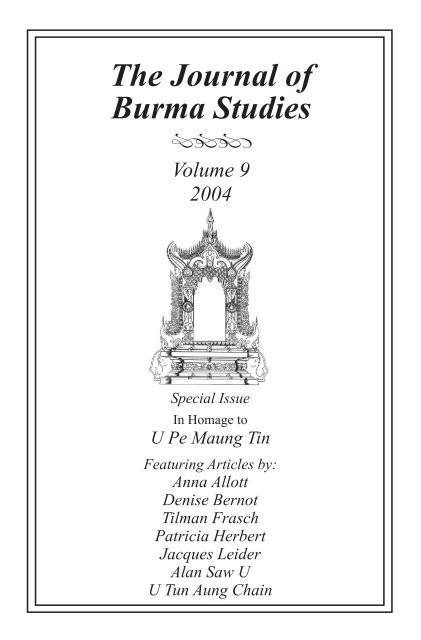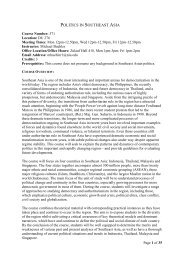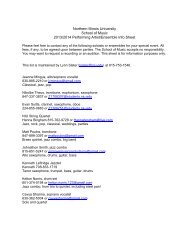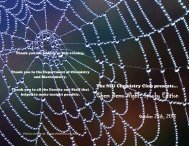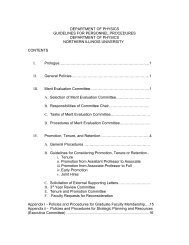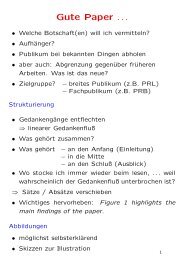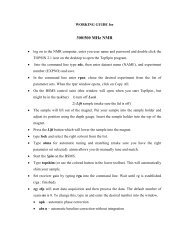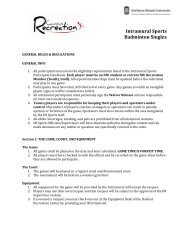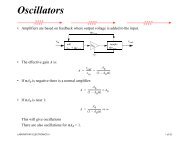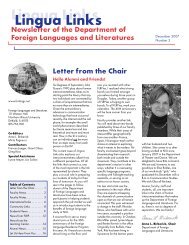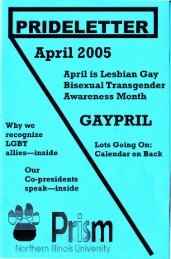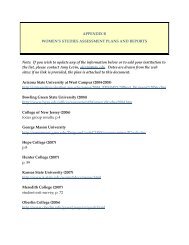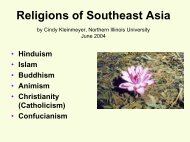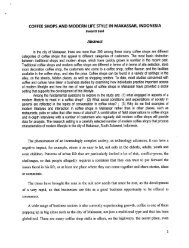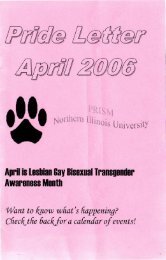The Journal of Burma Studies - Northern Illinois University
The Journal of Burma Studies - Northern Illinois University
The Journal of Burma Studies - Northern Illinois University
Create successful ePaper yourself
Turn your PDF publications into a flip-book with our unique Google optimized e-Paper software.
<strong>The</strong> <strong>Journal</strong> <strong>of</strong><br />
<strong>Burma</strong> <strong>Studies</strong><br />
Volume 9<br />
2004<br />
Special Issue<br />
In Homage to<br />
U Pe Maung Tin<br />
Featuring Articles by:<br />
Anna Allott<br />
Denise Bernot<br />
Tilman Frasch<br />
Patricia Herbert<br />
Jacques Leider<br />
Alan Saw U<br />
U Tun Aung Chain
<strong>The</strong> <strong>Journal</strong> <strong>of</strong> <strong>Burma</strong> <strong>Studies</strong><br />
Volume 9<br />
2004<br />
President, <strong>Burma</strong> <strong>Studies</strong> Group<br />
Mary Callahan<br />
General Editor<br />
Catherine Raymond<br />
Center for <strong>Burma</strong> <strong>Studies</strong><br />
<strong>Northern</strong> <strong>Illinois</strong> <strong>University</strong><br />
Guest Editor<br />
Anna Allo<br />
School <strong>of</strong> Oriental and African <strong>Studies</strong><br />
<strong>University</strong> <strong>of</strong> London<br />
Production Editor<br />
Caroline Quinlan<br />
Center for Southeast Asian <strong>Studies</strong><br />
<strong>Northern</strong> <strong>Illinois</strong> <strong>University</strong><br />
Copy Editors/Pro<strong>of</strong>readers<br />
Liz Poppens Denius<br />
Christopher A. Miller<br />
Publications Assistants<br />
Beth Bjorneby<br />
Mishel Filisha<br />
With Special Assistance from<br />
U Win Pe<br />
U Saw Tun<br />
© 2004 Southeast Asia Publications<br />
<strong>The</strong> Center for Southeast Asian <strong>Studies</strong><br />
<strong>Northern</strong> <strong>Illinois</strong> <strong>University</strong><br />
DeKalb, <strong>Illinois</strong> 60115 USA<br />
ISSN # 1094-799X
<strong>The</strong> <strong>Journal</strong> <strong>of</strong> <strong>Burma</strong> <strong>Studies</strong> is an annual scholarly journal<br />
jointly sponsored by the <strong>Burma</strong> <strong>Studies</strong> Group (Association<br />
for Asian <strong>Studies</strong>), the Center for <strong>Burma</strong> <strong>Studies</strong> (<strong>Northern</strong><br />
<strong>Illinois</strong> <strong>University</strong>), and <strong>Northern</strong> <strong>Illinois</strong> <strong>University</strong>’s Center<br />
for Southeast Asian <strong>Studies</strong>.<br />
Articles are refereed by pr<strong>of</strong>essional peers. For Submission<br />
Guidelines, please see our website: hp://www.niu.edu/<br />
cseas/seap/Submissions.htm or contact <strong>The</strong> Editor, Center<br />
for Southeast Asian <strong>Studies</strong>, <strong>Northern</strong> <strong>Illinois</strong> <strong>University</strong>,<br />
DeKalb, IL 60115. E-mail: seapeditor@niu.edu<br />
Subscriptions are $16 per volume delivered book rate<br />
(airmail add $10 per volume). Members <strong>of</strong> the <strong>Burma</strong> <strong>Studies</strong><br />
Group receive the journal and two bulletins as part <strong>of</strong> their<br />
$30 annual membership. Send check or money order in U.S.<br />
dollars drawn on a U.S. bank made out to “<strong>Northern</strong> <strong>Illinois</strong><br />
<strong>University</strong>” to Center for <strong>Burma</strong> <strong>Studies</strong>, <strong>Northern</strong> <strong>Illinois</strong><br />
<strong>University</strong>, DeKalb, IL 60115. Visa and Mastercard orders<br />
also accepted.<br />
Subscriptions:<br />
Tel: (815) 753-0512 Fax: (815) 753-1776 E-Mail: bbjorn@niu.edu<br />
Back Issues:<br />
Tel: (815) 756-1981 Fax: (815) 753-1776 E-Mail: seap@niu.edu<br />
For abstracts <strong>of</strong> forthcoming articles, visit <strong>The</strong> <strong>Journal</strong> <strong>of</strong> <strong>Burma</strong><br />
<strong>Studies</strong> website at: hp://www.niu.edu/cseas/seap/jbs.html<br />
<strong>The</strong> <strong>Journal</strong> <strong>of</strong> <strong>Burma</strong> <strong>Studies</strong> will be abstracted or indexed in<br />
the following: America: History and Life; Bibliography <strong>of</strong> Asian<br />
<strong>Studies</strong>; Historical Abstracts; MLA International Bibliography.
T J B S<br />
V 9<br />
2004<br />
A<br />
INTRODUCTION 7<br />
<br />
PROFESSOR U PE MAUNG TIN (1888–1973): 11<br />
<strong>The</strong> Life and Work <strong>of</strong> an Outstanding Burmese Scholar<br />
<br />
PROFESSOR U PE MAUNG TIN: 35<br />
A Gentle Genius, A Meek Master<br />
<br />
U PE MAUNG TIN—RESEARCHER, SCHOLAR, PEDAGOGUE: 42<br />
His Contribution to Burmese <strong>Studies</strong> in France<br />
<br />
U PE MAUNG TIN'S AND LUCE'S GLASS PALACE REVISITED 52<br />
<br />
NOTES ON DIPAVAMSA: 70<br />
An Early Publication by U Pe Maung Tin<br />
<br />
TEXT, LINEAGE, AND TRADITION IN BURMA: 82<br />
<strong>The</strong> Struggle for Norms and Religious Legitimacy<br />
Under King Bodawphaya (1782-1819)<br />
. <br />
U PE MAUNG TIN BIBLIOGRAPHY 130<br />
.
PROFESSOR U PE MAUNG TIN<br />
A Gentle Genius, A Meek Master<br />
Alan Saw U*<br />
It is a great privilege and honor to provide a brief reflection on<br />
the life <strong>of</strong> Pr<strong>of</strong>essor U Pe Maung Tin as a practicing Christian.<br />
His achievements as a Pali scholar and as a pioneer in the study<br />
<strong>of</strong> Burmese literature and history are all well documented. It<br />
is to be regreed, therefore, that there is much less on record,<br />
let alone published, regarding his teaching <strong>of</strong> Christianity and<br />
the Christian ministry in <strong>Burma</strong>. Consequently, this article<br />
will be a very general one as it is based simply on my limited<br />
readings <strong>of</strong> the few available papers wrien by him as a<br />
Burmese Christian leader and a communicant member <strong>of</strong> the<br />
Anglican Church in <strong>Burma</strong>.<br />
C H<br />
U Pe Maung Tin’s father, U Pe, was a very strong and devout<br />
Baptist Christian. He had been baptized by his own father, the<br />
Reverend Tha Dun Aung, first national pastor <strong>of</strong> the Burmese<br />
Baptist Church in Henzada in the delta region <strong>of</strong> <strong>Burma</strong>. U Pe<br />
and his family were said to have been deeply influenced by<br />
a book on the Christian way <strong>of</strong> life wrien by J. N. Derby, a<br />
founder <strong>of</strong> the Church <strong>of</strong> the Plymouth Brethren, and also by<br />
John Bunyan’s Pilgrim’s Progress. An adapted translation by U<br />
Pe <strong>of</strong> the laer, called Ko Thuka, the Traveller, was published<br />
by the <strong>Burma</strong> Christian Literature Society, as well as two other<br />
works by him in Burmese, Christian Families in the Bible and<br />
Life <strong>of</strong> the Apostle Paul.<br />
Later, when the family moved to Rangoon, they met<br />
with Mr. Galstin, an Armenian missionary belonging to the<br />
∗ Executive Secretary and Editor <strong>of</strong> the Myanmar Christian<br />
Literature Society. This article was developed from a paper read at<br />
the September 1988 symposium the School <strong>of</strong> Oriental and African<br />
<strong>Studies</strong>, <strong>University</strong> <strong>of</strong> London, in honor <strong>of</strong> Pr<strong>of</strong>essor U Pe Maung<br />
Tin.<br />
<strong>Journal</strong> <strong>of</strong> <strong>Burma</strong> <strong>Studies</strong>, Volume 9 35
Alan Saw U<br />
Church <strong>of</strong> the Plymouth Brethren. When U Pe discovered that<br />
his own Christian beliefs corresponded to the teachings <strong>of</strong><br />
the Plymouth Brethren, he and his family formed a church <strong>of</strong><br />
their own. Following Mr. Galstin’s death, U Pe’s brother, U Tun<br />
Nyein, assumed leadership <strong>of</strong> the Brethren Church. This uncle<br />
<strong>of</strong> U Pe Maung Tin was known as a pioneer lexicographer,<br />
having compiled an English-Burmese dictionary as early as<br />
1906. U Tun Nyein also initiated the preparation <strong>of</strong> the Bible<br />
Society’s Burmese translation <strong>of</strong> the Bible, commonly known<br />
as the Gerrad version to distinguish it from the Baptist version<br />
by Adoniram Judson.<br />
During his tenure as a pr<strong>of</strong>essor in Rangoon, U Pe<br />
Maung Tin aended the Anglican Holy Cross Church, close to<br />
the university compound. <strong>The</strong>re he was genuinely moved by<br />
the teachings and sermons <strong>of</strong> the Reverend George Appleton<br />
and decided to go forward for confirmation. When the <strong>Burma</strong><br />
Christian Literature Society was reorganized aer the war,<br />
under the auspices <strong>of</strong> the <strong>Burma</strong> Council <strong>of</strong> Churches, he<br />
became its first director, and for many years served as the<br />
chairman <strong>of</strong> its study commission on Buddhism. During the<br />
early 1960s, in the interest <strong>of</strong> increased interfaith understanding<br />
between Christians and Buddhists, he published three works<br />
in English and one in Burmese. 1<br />
C A<br />
U Pe Maung Tin was convinced that in order to create a<br />
trusting bond with others <strong>of</strong> different faiths, relationships<br />
needed to be based upon love, a desire to learn, and patient<br />
understanding. He believed that communication needed to<br />
be a two-way process, receiving as well as giving. In 1961,<br />
in an outspoken and challenging paper, “Certain Factors in<br />
the Buddhist-Christian Encounter,” U Pe Maung Tin pointed<br />
directly to several ways in which the Christian aitude to<br />
mission and ministry needed to be changed: 2<br />
A few years ago on the centenary <strong>of</strong> Adoniram<br />
Judson, I had occasion to make a careful<br />
36 <strong>Journal</strong> <strong>of</strong> <strong>Burma</strong> <strong>Studies</strong>, Volume 9
Pr<strong>of</strong>essor U Pe Maung Tin<br />
comparison <strong>of</strong> Judson’s Bible and the Burmese<br />
Bible <strong>of</strong> the British and Foreign Bible Society.<br />
I discovered to my surprise that while the<br />
Society Bible was a correct translation according<br />
to Anglo-Burmese syntax, the Judson Bible<br />
approached nearer the style <strong>of</strong> the Burmese<br />
Buddhist writings, so that it was found more<br />
readable by the Buddhist monks unacquainted<br />
with English.<br />
One example will show that Judson<br />
consulted learned Buddhist monks in preparing<br />
his translation. He must have found the Holy<br />
Spirit very difficult to put into Burmese. <strong>The</strong><br />
usual Burmese word nat for spirit would not be<br />
appropriate as it would suggest animistic ideas<br />
or a deity or divine inhabitant <strong>of</strong> the heavenly<br />
worlds. To translate the Holy Spirit literally as<br />
Holy Ghost would be ludicrous in Burmese.<br />
Judson ultimately chose vinyana<br />
[in Burmese wiva \], a Pali word meaning<br />
consciousness. Objection against it might be<br />
made on the ground that consciousness as one<br />
<strong>of</strong> the 12 factors <strong>of</strong> ‘conditioned genesis’—which<br />
teaches that everything is conditioned, relative,<br />
and interdependent—leads to decay and death,<br />
and as such is not a suitable rendering for the<br />
Holy Spirit.<br />
But vinyana is the very word used by<br />
some sections <strong>of</strong> Buddhist thought in <strong>Burma</strong> to<br />
denote supermundane consciousness, which,<br />
they say, transcends the law <strong>of</strong> ‘conditioned<br />
genesis’ and persists in Nirvana aer a man’s<br />
death. That Judson chose this word for the Holy<br />
Spirit shows that he was well acquainted with<br />
the finer shades <strong>of</strong> Buddhist philosophy. . . .<br />
<strong>The</strong> successors <strong>of</strong> Judson have neglected<br />
scholarship. <strong>The</strong>y have not followed up the lead<br />
<strong>Journal</strong> <strong>of</strong> <strong>Burma</strong> <strong>Studies</strong>, Volume 9 37
Alan Saw U<br />
that Judson gave in Burmese scholarship. Most<br />
<strong>of</strong> the tracts that they have wrien in Burmese<br />
are not so readable as the Judson Bible. <strong>The</strong>y<br />
have not produced a standard grammar and<br />
dictionaries based on Judson’s work. And they<br />
have not studied Buddhism. <strong>The</strong>y evidently<br />
came to teach not to learn.<br />
In their eagerness to serve the lay people,<br />
they have neglected the Buddhist monks, not<br />
realizing that the monks are the custodians<br />
<strong>of</strong> the Buddhist faith. <strong>The</strong>y have not even<br />
produced a life <strong>of</strong> the Buddha as the Catholic<br />
Bishop Bigandet did. . . .<br />
And Judson College imported Pali<br />
lecturers from India instead <strong>of</strong> from the USA.<br />
How a Christian mission could hope to succeed<br />
in making <strong>Burma</strong> Christian without studying<br />
Buddhism and converting the monks passes my<br />
understanding. . . .<br />
To preach the gospel <strong>of</strong> Christ without<br />
any knowledge <strong>of</strong> the life <strong>of</strong> the Buddha,<br />
presenting Christ to the peoples <strong>of</strong> <strong>Burma</strong> as<br />
though he were a westerner, is to ignore the<br />
historical background <strong>of</strong> the three wise men<br />
from the east and all the Buddhist-Christian<br />
parallels. One would have thought that the<br />
first thing to do in approaching Buddhists was<br />
to arouse their interest by drawing aention to<br />
these parallels.<br />
<strong>The</strong>se Buddhist-Christian parallels in<br />
the lives <strong>of</strong> Buddha and Christ should lead<br />
to research into the possibility <strong>of</strong> parallels in<br />
the doctrines <strong>of</strong> Buddhism and Christianity.<br />
<strong>The</strong> following subjects for comparative study<br />
suggest themselves:<br />
• Christian and Buddhist ideas <strong>of</strong> selflessness<br />
• <strong>The</strong> idea <strong>of</strong> God in Buddhism<br />
38 <strong>Journal</strong> <strong>of</strong> <strong>Burma</strong> <strong>Studies</strong>, Volume 9
Pr<strong>of</strong>essor U Pe Maung Tin<br />
• Faith and grace in Buddhism<br />
• Christian prayer and Buddhist meditation<br />
• Nirvana and the Kingdom <strong>of</strong> Heaven<br />
• Buddhist mea and Christian charity<br />
• Man in Buddhism and Christianity<br />
It should be mentioned, however, that<br />
it is not enough merely to state the parallels<br />
legendary or doctrinal between the two religions<br />
or to stress the historical precedence <strong>of</strong> the<br />
Buddhist versions. What is important is for the<br />
Christian to study the Buddhist way <strong>of</strong> presenting<br />
and solving the various problems, and to adjust<br />
his own approach to Buddhism in the light <strong>of</strong> such<br />
study.<br />
U Pe Maung Tin follows this useful general advice<br />
to Christian missionaries by revealing comments on the<br />
reorganization <strong>of</strong> the <strong>University</strong> <strong>of</strong> Rangoon aer 1948:<br />
<strong>The</strong>re is a lesson to learn from the closing down <strong>of</strong><br />
Judson College—one <strong>of</strong> the original constituent<br />
colleges <strong>of</strong> the <strong>University</strong> <strong>of</strong> Rangoon founded in<br />
1920. 3 When <strong>Burma</strong> regained her independence<br />
she lost no time in changing the <strong>University</strong> from<br />
the collegiate paern into the unitary paern,<br />
against the recommendation <strong>of</strong> the Rangoon<br />
<strong>University</strong> Reorganization Commiee.<br />
It was an open secret that this was done<br />
not because the unitary paern was preferred<br />
to the collegiate one but simply because the<br />
unitary paern le no room for Judson College<br />
to continue to function as an individual college.<br />
Judson College was closed down because it was<br />
an American missionary college. It is significant<br />
that while the memory <strong>of</strong> Judson was held in<br />
respect, the college which bore his name should<br />
have been closed down. <strong>The</strong> Judson Bible was a<br />
<strong>Journal</strong> <strong>of</strong> <strong>Burma</strong> <strong>Studies</strong>, Volume 9 39
Alan Saw U<br />
welcome contribution to Burmese literature and<br />
the Buddhists would never dream <strong>of</strong> burning it,<br />
but Judson College with its fine academic record<br />
was closed down.<br />
It was the foreignness <strong>of</strong> the presentation<br />
<strong>of</strong> Christianity to which objection was raised.<br />
<strong>Burma</strong>ns had lost their country to the politicians<br />
but they were determined not to lose their<br />
religion and culture to the missionaries. One<br />
did not fully realise what it meant to Burmese<br />
Buddhists to become Christians in the days <strong>of</strong><br />
the British regime: it was not simply a change<br />
<strong>of</strong> faith. It meant that on becoming a Christian, a<br />
<strong>Burma</strong>n became de-burmanised and pro-western.<br />
<strong>The</strong>y are content with the heritage <strong>of</strong> their<br />
Buddhist culture and will not willingly change<br />
it for the Western form <strong>of</strong> Christianity that has<br />
brought war and strife in its wake.<br />
h<br />
<strong>The</strong> life and work <strong>of</strong> U Pe Maung Tin are in direct<br />
contradiction to this comment. All that he did and achieved<br />
exemplified that in becoming a Christian, a <strong>Burma</strong>n could<br />
also become more truly Burmese, more patriotic, more deeply<br />
understanding <strong>of</strong> his country’s religion and history, and beer<br />
able to interpret it to foreigners.<br />
U Pe Maung Tin’s colleagues, friends, and pupils were<br />
all touched and awed by his serenity, sincerity, simplicity,<br />
humility, and honesty. His basic Christian conviction was that<br />
one should think less <strong>of</strong> one’s own self than <strong>of</strong> the needs <strong>of</strong><br />
others. Throughout his life he lived not to be served, but to<br />
serve.<br />
Footnotes<br />
1 Prayer and Meditation (Rangoon: <strong>Burma</strong> Christian Council, 1960);<br />
Buddhist-Christian Parallels (Rangoon: <strong>Burma</strong> Christian Council, 1961);<br />
How to Read the Old Testament (Rangoon: <strong>Burma</strong> Christian Literature<br />
Society, 1962, in Burmese); and Buddhist Devotion and Meditation: An<br />
Objective Description and Study (London: Society for the Promotion <strong>of</strong><br />
40 <strong>Journal</strong> <strong>of</strong> <strong>Burma</strong> <strong>Studies</strong>, Volume 9
Pr<strong>of</strong>essor U Pe Maung Tin<br />
Christian Knowledge, 1964). <strong>The</strong>se correspond to nos. 177, 180, 185,<br />
and 194 in Herbert’s bibliography, this volume.<br />
2 This unpublished paper was presented in February 1961 by U Pe<br />
Maung Tin at a seminar in Rangoon on the theme <strong>of</strong> the Buddhist-<br />
Christian encounter. <strong>The</strong> seminar was jointly sponsored by the East<br />
Asia Christian Conference and the World Council <strong>of</strong> Churches. <strong>The</strong><br />
full text was later published by the Myanmar Christian Literature<br />
Society as Buddhist-Christian Encounter Series No. 1 for limited<br />
circulation for the symposium held in September 1998 at the School<br />
<strong>of</strong> Oriental and African <strong>Studies</strong>, <strong>University</strong> <strong>of</strong> London, in honor <strong>of</strong> U<br />
Pe Maung Tin.<br />
3 See Allo article, this volume.<br />
<strong>Journal</strong> <strong>of</strong> <strong>Burma</strong> <strong>Studies</strong>, Volume 9 41


